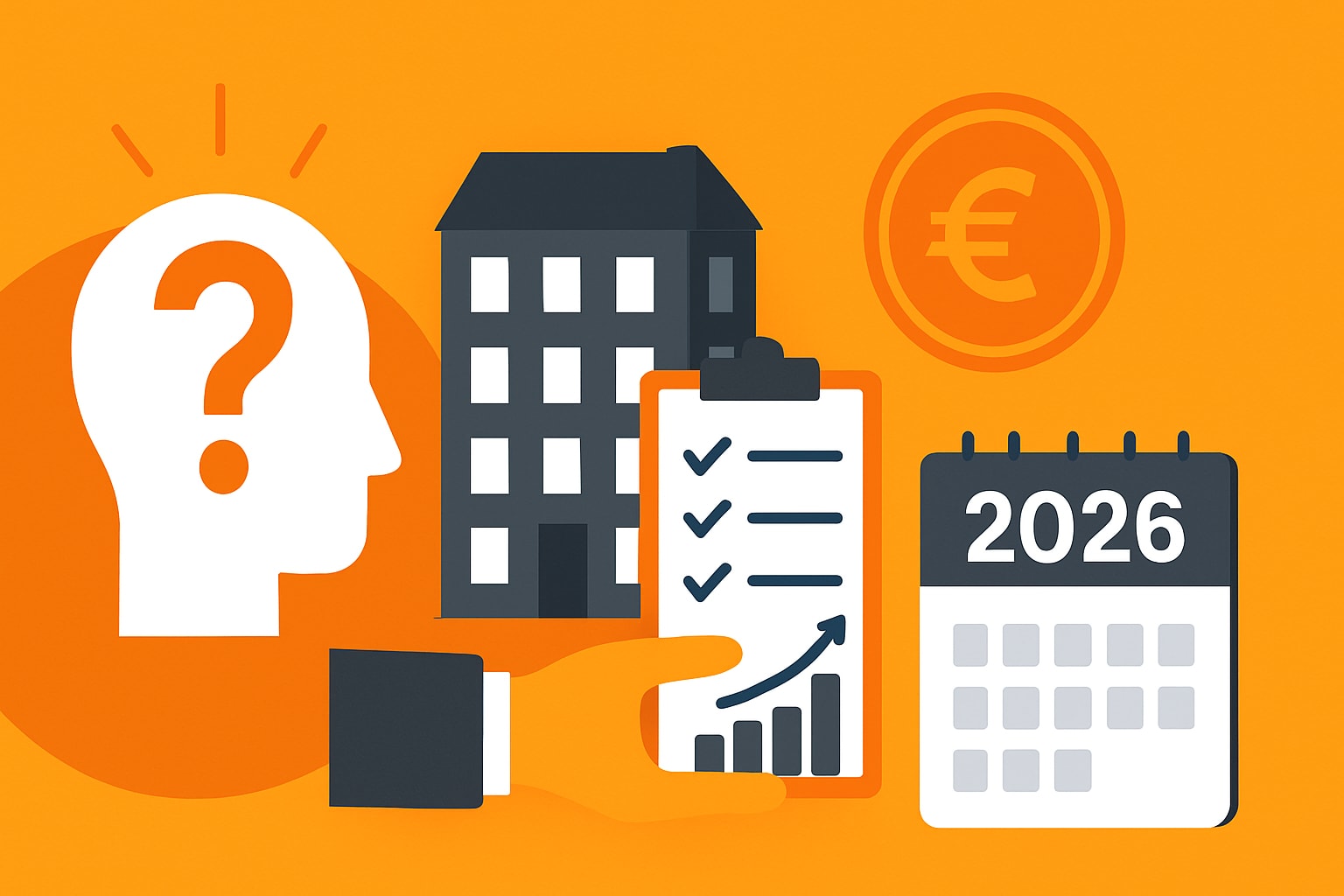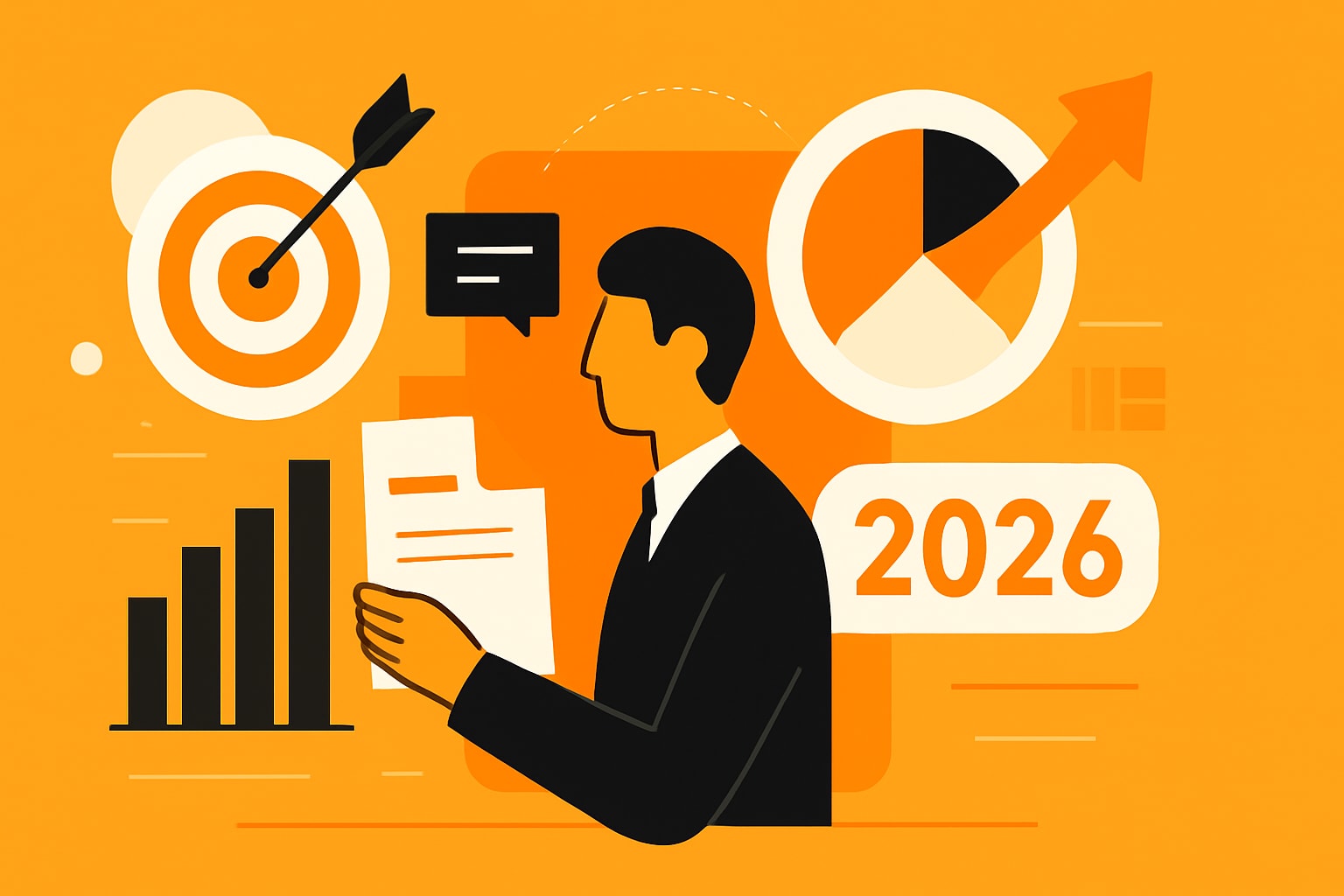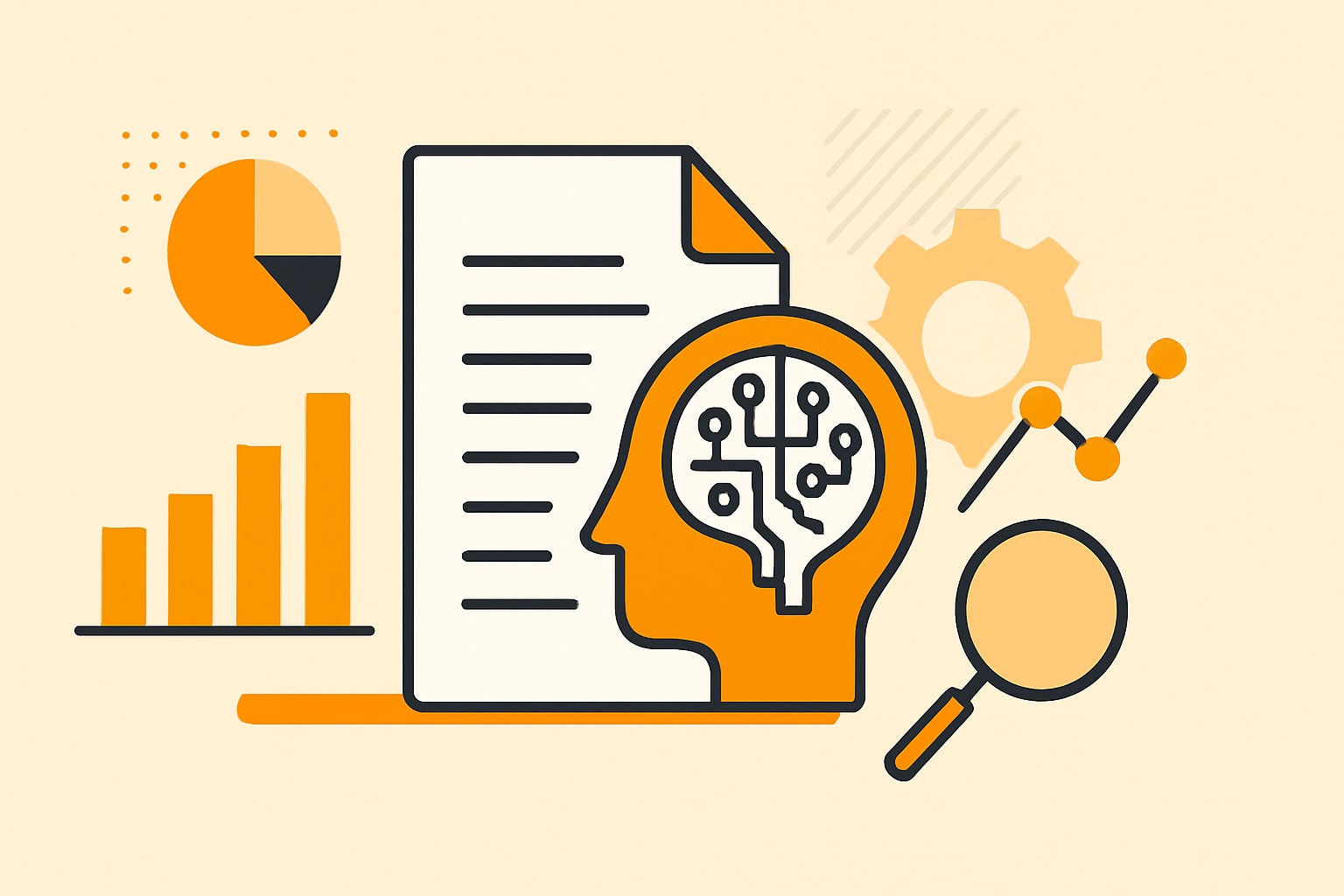The Apple Developer Program

Do you want to develop your own apps but don’t know where to start? The Apple Developer Program 2025 makes getting started more attractive than ever, especially for beginners.
The Apple ecosystem is growing rapidly, and the demand for creative app ideas is rising. With the Apple Developer Program, you get access to professional tools, resources, and real monetization opportunities.
Benefit from exclusive advantages, develop apps for millions of users, and learn step by step how to bring your ideas to the App Store.
Start now – this guide covers everything important: requirements, enrollment, tools, costs, first app, and valuable tips for beginners.
What is the Apple Developer Program?
The Apple Developer Program is the central access point for anyone who wants to develop and publish their own apps in the Apple ecosystem. It is aimed at beginners, professionals, companies, and educational institutions that want to bring innovative ideas to iPhone, iPad, Mac, and more.
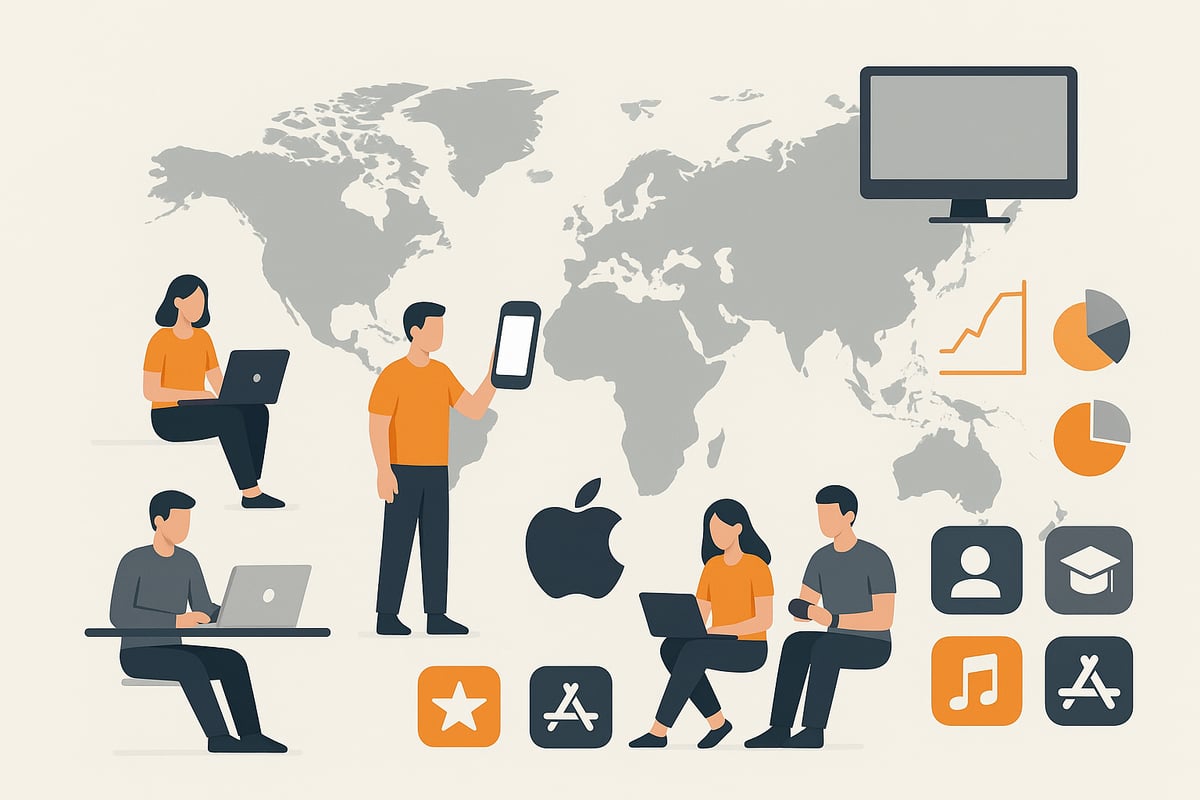
Overview and significance
The Apple Developer Program is fundamentally different from a free Apple ID. While an Apple ID is only intended for personal use, the Apple Developer Program opens the door to app development and distribution on the App Store, Mac App Store, or for Safari extensions.
The target groups are diverse:
-
Individuals who want to build their first app
-
Companies developing professional solutions
-
Educational institutions promoting learning projects
In 2024, more than 34 million developers worldwide use the Apple Developer Program. This shows its enormous reach and importance. Compared to other platforms like Google Play Console or Microsoft Store, Apple offers particularly high quality standards and access to exclusive technologies.
Another advantage: The Apple Developer Program enables you to publish apps across all Apple platforms. Whether iOS, macOS, watchOS, or tvOS – you can reach users around the world.
If you want to learn more about the contents and benefits of a membership, you’ll find a compact overview in the article Apple Developer Program: Wofür wird es benötigt und welche Inhalte bietet eine Mitgliedschaft?.
Key features and benefits
With the Apple Developer Program, you have access to numerous tools and resources that help not only professionals but also beginners bring their own apps to life. A major plus is access to beta versions of iOS, macOS, watchOS, and tvOS. This lets you test your app early on new platforms.
The most important tools include:
-
Xcode for developing and testing apps
-
TestFlight for organizing beta tests and collecting feedback
-
CloudKit and other APIs for cloud functionality
The Apple Developer Program also offers numerous monetization options: in-app purchases, subscriptions, or ads can be integrated directly and offered worldwide.
Support is a priority as well: developer forums, extensive documentation, and personal support are available. You can also attend exclusive Apple events and get early access to new technologies.
With these benefits, the Apple Developer Program is the ideal platform for turning your own app ideas into reality safely and professionally.
Requirements and enrollment in the Apple Developer Program
Getting started with the Apple Developer Program is straightforward, but there are some important requirements you should keep in mind. Especially for beginners, it’s crucial to understand the technical and personal prerequisites to ensure a smooth process.
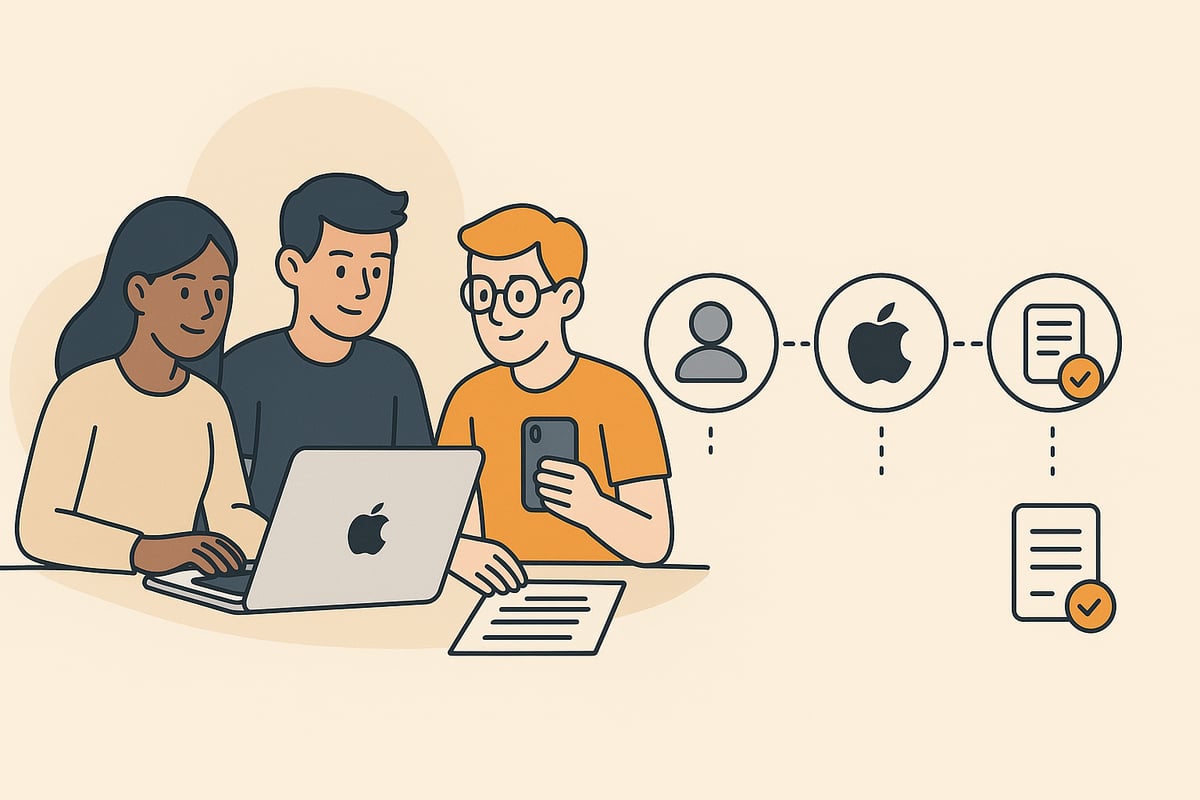
Technical and personal requirements
To get started with the Apple Developer Program, you must be at least 18 years old. A valid Apple ID is mandatory, as it serves as the central identity across the Apple ecosystem.
For development, a Mac computer with a current version of macOS is recommended. An iPhone or iPad for testing isn’t strictly required but is very helpful for validating realistic user experiences.
Knowledge of Swift or Objective‑C is useful, as these languages are the standard for app development on Apple platforms. Alternatively, there are frameworks and tools that make it easier to get started.
-
Minimum age: 18 years
-
Own Apple ID
-
Mac computer (recommended)
-
iPhone/iPad for testing (optional but useful)
-
Basic knowledge of Swift or Objective‑C
With these prerequisites, you’re ready to take the next step in the Apple Developer Program.
Step-by-step guide to enrollment
Enrollment in the Apple Developer Program is entirely online. First, you’ll need an Apple ID, which you can easily create and verify on Apple’s website. Then head to the developer site to sign up for the program.
A helpful overview is provided by the Guide to registering for the Apple Developer Program, which describes all steps in detail.
Here is a compact table for the process:
|
Step |
Description |
|---|---|
|
Create Apple ID |
Registration and verification |
|
Choose account type |
Individual, company, education |
|
Verify identity |
Upload ID/documents |
|
Pay annual fee |
99 USD per year (as of 2024) |
|
Gain access |
After confirmation you can start |
Make sure all details are correct and have the required documents ready. This ensures your enrollment in the Apple Developer Program is processed quickly.
Common pitfalls and solutions
Especially with the Apple Developer Program, errors often occur during verification or when uploading documents. Carefully check all information and verify file formats before uploading.
Payment can also sometimes cause problems, for example if credit card data isn’t accepted. Often a second attempt or contacting Apple Support helps.
Common pitfalls:
-
Identity verification is rejected
-
Payment fails
-
Documents in the wrong format
Tips for a smooth process:
-
Use official documents (e.g., passport)
-
Upload documents as PDF or JPG
-
Check that your Apple ID is up to date
With these tips, you’ll master enrollment in the Apple Developer Program and can focus entirely on developing your first app.
The most important tools and resources for beginners
Getting started with the Apple Developer Program works best when you know the right tools and resources. The selection is large, but some tools are particularly valuable for beginners. With the right setup, you can celebrate early successes and implement your app ideas more effectively.
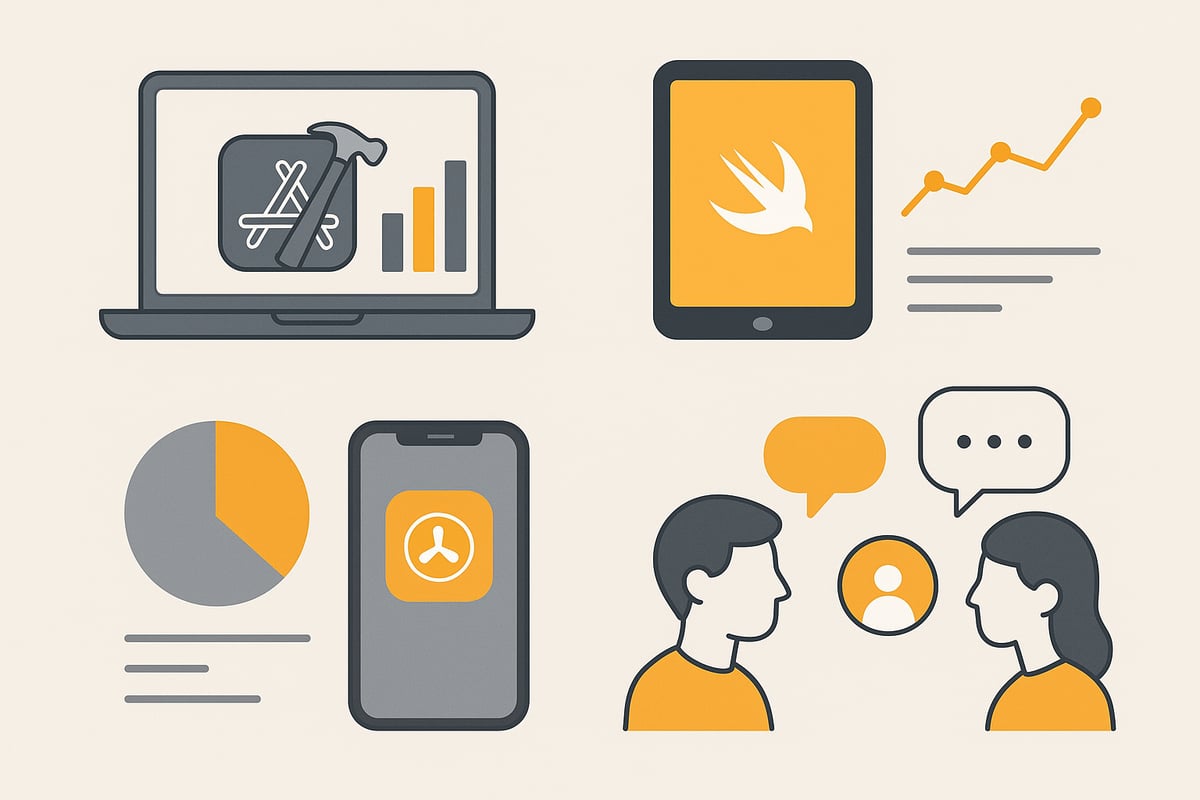
Apple Developer tools at a glance
Within the Apple Developer Program, you have access to some of the best developer tools. For beginners, the following are especially relevant:
-
Xcode: The central development environment for iOS, macOS, watchOS, and tvOS. This is where you write your code, design the UI, and test your app directly in the simulator.
-
Swift Playgrounds: Perfect for beginners. With this app, you can learn Swift in a playful way and try your first small projects directly on iPad or Mac.
-
TestFlight: Enables beta testing of your app with real users. You can evaluate feedback directly within the Apple Developer Program and implement improvements.
-
Simulators: Simulate various devices and operating systems to test your app without owning every real device.
A tabular overview helps you better categorize the tools:
|
Tool |
Main function |
Suitable for beginners |
|---|---|---|
|
Xcode |
Development & debugging |
Yes |
|
Swift Playgrounds |
Learn to code |
Yes |
|
TestFlight |
Beta testing & feedback |
Yes |
|
Simulators |
Device and OS simulation |
Yes |
With these tools in the Apple Developer Program, you can get started right away and build your first app prototypes.
Resources and learning materials
The learning curve in the Apple Developer Program is eased by high-quality resources. Particularly helpful are:
-
Official Apple Developer documentation: Detailed guides and examples for all frameworks.
-
Apple Developer Academy: Programs and workshops for beginners.
-
Free online courses: Many platforms offer beginner courses on Swift, Xcode, and app design.
-
Community forums & meetups: Exchanging ideas with others in the Apple Developer Program is invaluable. Stack Overflow and local meetups are ideal places to start.
-
Sample projects & open source: Learn from real projects and study publicly available code.
-
No-code solutions: If you don’t have any programming experience yet, you can find an alternative entry into the Apple Developer Program with developing apps without code.
According to the Stack Overflow Developer Survey 2024, most beginners use a combination of documentation, online courses, and community support. This way, you’ll quickly find answers to your questions and always stay up to date in the Apple Developer Program.
Costs, benefits, and monetization options
Getting started with the Apple Developer Program comes with manageable costs and, in return, offers attractive benefits for app developers. Especially for beginners, it’s worth taking a closer look at the pricing structure, the exclusive services, and the different paths to monetization.
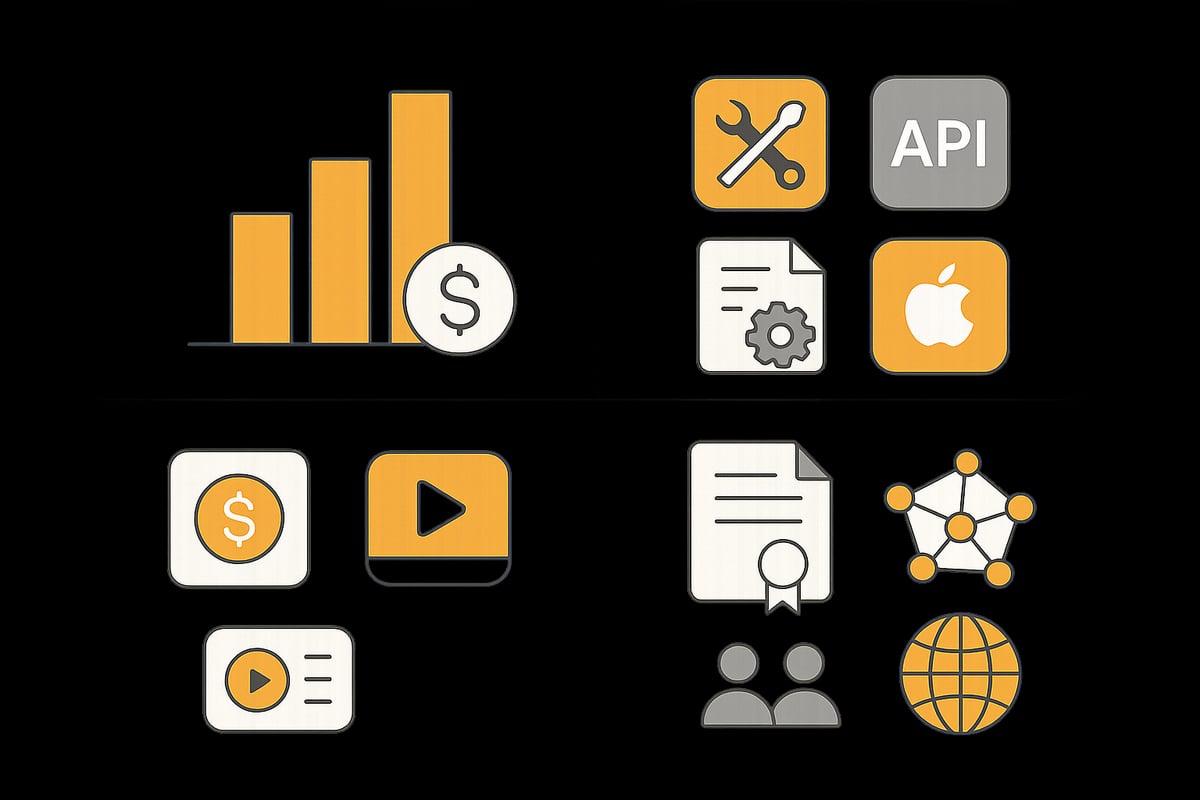
Cost structure of the program
Participation in the Apple Developer Program costs 99 USD per year for individuals and companies. Educational institutions often benefit from special conditions or free access, which is particularly attractive for students.
In addition to the annual fee, you should also consider optional costs. These include, for example, a Mac for development, an iPhone or iPad for testing, as well as fees for additional certificates. You can find an up-to-date overview of the membership options in the Apple Developer Program directly from Apple.
This table shows the most important costs in comparison:
|
Category |
Individual |
Company |
Educational institution |
|---|---|---|---|
|
Annual fee |
99 USD |
99 USD |
Varies/free |
|
Hardware |
Mac, iPhone/iPad |
Mac, iPhone/iPad |
Mac, iPhone/iPad |
|
Additional fees |
Certificates, tools |
Certificates, tools |
Certificates, tools |
The cost structure remains clear and transparent.
Benefits for members
Members of the Apple Developer Program benefit from exclusive advantages. You get access to beta versions of iOS, macOS, watchOS, and tvOS, can test new APIs and frameworks right away, and benefit from personal support.
A major plus is the worldwide distribution of your apps via the App Store. In addition, modern technologies such as Apple Pay, Sign in with Apple, and CloudKit are available to you. These features make integrating payment and login functions much easier.
Access to developer events, workshops, and forums is also part of the Apple Developer Program. This way, you always stay up to date and can network with other developers.
Monetization options
The Apple Developer Program opens up numerous ways to monetize your app. You can integrate in-app purchases, subscriptions, or ads and thus address different target groups.
Many successful German apps rely on a freemium model, where basic functions are free and additional features are unlocked via in-app purchase. According to Statista, the average income of iOS developers in 2023 was around 19,000 euros per app.
Here is an overview of the most important monetization paths:
-
In-app purchases (e.g., additional content, features)
-
Subscriptions (monthly, yearly)
-
Advertising (banner, interstitials)
-
One-time app purchases
The choice of the right model depends on your app idea and target audience.
Legal and tax aspects
With the Apple Developer Program, you must observe certain legal and tax requirements. These include correctly providing tax information, complying with contracts, and adhering to privacy policies.
Especially when monetizing and distributing abroad, you should deal with tax issues early on. Apple requires tax data and checks compliance with local laws. Regularly inform yourself about current compliance requirements in the Apple Developer Program to avoid unpleasant surprises.
With good preparation, you lay the foundation for long-term success.
The path to your first app: step-by-step guide
Getting started with the Apple Developer Program is the first step to your own app in the Apple ecosystem. With the right strategy and clear stages, an idea quickly becomes a finished product. Below you’ll find a structured guide on how to get from the initial idea to publishing on the App Store.
Ideation and planning
The foundation of a successful app lies in thoughtful planning. First analyze the market: Are there already similar apps? Which target group do you want to address? A competitor analysis helps you identify opportunities and unique selling points.
Use the Apple Design Guidelines to develop a consistent and user-friendly design from the start. Consider which features absolutely need to be in the first version and which you can add later. A clear focus on the so-called Minimum Viable Product (MVP) saves time and resources.
If you’re unsure how best to approach the Apple Developer Program and app platforms, you’ll find more helpful information and comparisons of different platforms in the article Getting started with app platforms.
At the end of this phase, you should have a concrete plan, a rough app concept, and initial sketches.
Development and testing
Once the concept is set, you start developing your app in the Apple Developer Program. Create a new project in Xcode and begin with the UI design. Use Storyboards, SwiftUI, or Interface Builder to build the user interface.
Program the core features step by step. Test regularly on the integrated simulator and—more importantly—on real devices to ensure a realistic user experience. TestFlight helps you distribute beta versions to friends or testers and gather valuable feedback.
Make sure to detect and fix errors early. A structured approach saves you a lot of effort later in the review process.
With each development step, your app moves closer to market readiness.
Publishing on the App Store
The final step in the Apple Developer Program is publishing your app. Set up an entry in App Store Connect. Upload all necessary metadata, screenshots, and a compelling description.
Prepare for the review process by carefully following Apple’s guidelines. Check whether your app meets all technical and legal requirements. Typical sources of error are missing privacy policies or incomplete screenshots.
After successful approval, you can acquire your first users and collect feedback. Remember to release updates and improvements regularly to continue developing your app.
With this structured workflow, you can make the leap from idea to your own app in the Apple universe.
Tips, best practices, and common mistakes for beginners
Starting out with the Apple Developer Program brings many opportunities but also challenges. Especially at the beginning, it’s important to adopt proven strategies and be aware of common pitfalls. This ensures a successful start and enables you to fully leverage the potential of the Apple Developer Program.
Successful strategies for beginners
A strong start in the Apple Developer Program begins with networking. Use local meetups or online communities to learn from experienced developers. The exchange helps solve questions and keeps you motivated.
Rely on official resources from the Apple Developer Program. The documentation, forums, and tutorials provide solid knowledge and guide you step by step. Many beginners benefit from courses at the Apple Developer Academy or free online offerings.
Keep learning continuously. The world of the Apple Developer Program evolves rapidly. Stay curious about new frameworks like SwiftUI or ARKit and follow regular updates to Swift. This keeps you competitive and lets you integrate innovative features directly into your projects.
Avoiding common beginner mistakes
Many mistakes in the Apple Developer Program can be avoided with good preparation. The app review process often fails due to incomplete information or missing test data. Carefully check all metadata and make sure your app has been thoroughly tested.
Another problem is unclear or missing privacy policies. Make sure all legal requirements are met. Good document management helps you organize contracts and important documents.
Avoid starting with projects that are too complex. Focus on a Minimum Viable Product that covers the core function. This way you’ll gather feedback quickly and can improve the app step by step. Mistakes are normal, but those who learn from them will succeed in the Apple Developer Program.
Career prospects and trends
The Apple Developer Program opens up numerous career paths. Many developers start as freelancers or gain their first experience in small agencies. Large companies are also looking for talent with experience in the Apple Developer Program.
Certifications and further training can make entry easier. Skills in Swift, SwiftUI, and new technologies such as AI or AR are particularly in demand. Trends like ARKit or machine learning offer exciting opportunities to specialize.
Stay on the pulse of the times and take every opportunity to learn. The demand for experts in the Apple Developer Program is steadily growing. Those who are committed can benefit long-term from attractive job offers and exciting projects.
You now have a clear overview of how to get started with the Apple Developer Program 2025 and what opportunities it opens up for you. Especially as a beginner, you benefit enormously when you make your processes efficient from the start—not only in app development, but also in everyday tasks like file management. With filehub, you can easily automate tedious workflows, save time, and focus fully on your projects. Just give it a try—try filehub.one for free now and discover how much easier your developer life can be!
